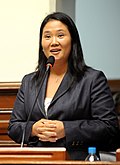Peruvian general election, 2011
|
|
|||||||||||||||||||||||
|
|||||||||||||||||||||||
|
|||||||||||||||||||||||
|
|
|||||||||||||||||||||||
| Second round winner by region | |||||||||||||||||||||||
|
|||||||||||||||||||||||
The Peruvian general election, 2011 took place on 10 April 2011. Since no candidate received more than half of all valid votes, a second round was necessary to determine the winner. This second round took place on 5 June and determined the successor of Alan García, as well as 130 members of the Peruvian Congress and 5 members of the Andean Parliament. Former army officer and left-wing politician Ollanta Humala narrowly defeated Keiko Fujimori, daughter of imprisoned former President Alberto Fujimori. Humala was sworn in on 28 July as 94th President of Peru and had served a term of five years. Each candidate had two vice-presidential candidates.
After the third presidential term of Alberto Fujimori, new rules were established to curtail presidential authority. The outgoing president is now forbidden to run for reelection until five years have elapsed since the end of a presidential term.
Peruvian politics adhere to a multi-party system, in which no one political group has a majority in Congress. This has led recent administrations to form loose alliances while in office to govern effectively. Such multi-party system has been in place ever since the administration of President Alberto Fujimori (1990–2000), following his 1992 dissolution of Congress
...
Wikipedia



